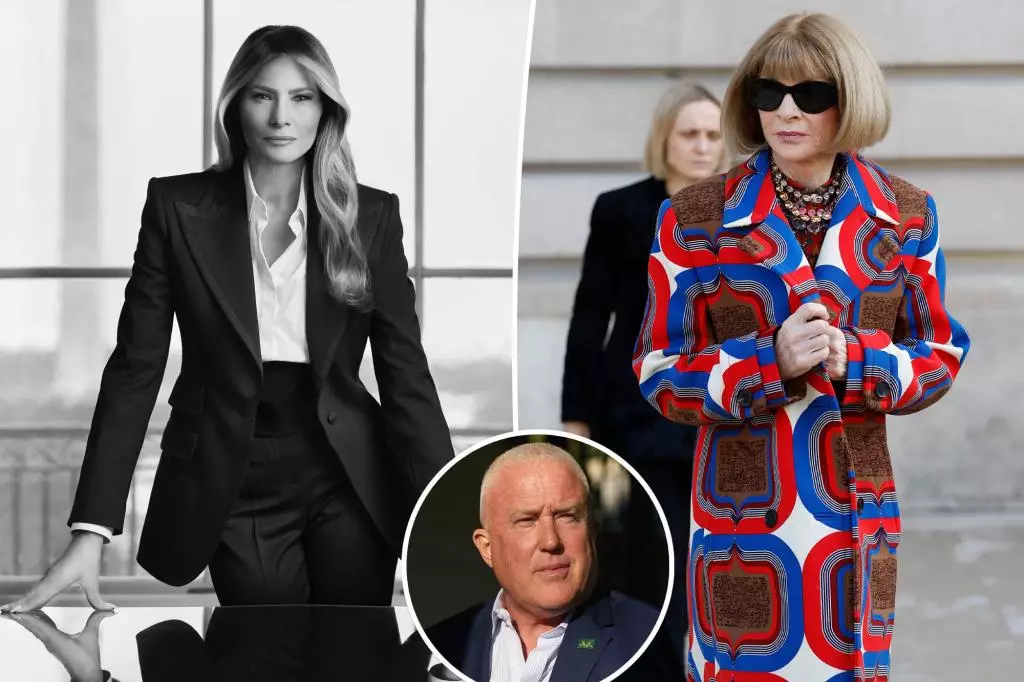In the ever-evolving world of fashion, where aesthetics can often overshadow substance, the recent critique of Melania Trump by Vogue has ignited a whirlwind of reactions. Friends and supporters of the former First Lady are up in arms, labeling Anna Wintour’s editorial stance as not just an affront to Melania but an outright betrayal of the values they uphold. Bill White, a close associate and Donald Trump’s nominee for Ambassador to Belgium, encapsulates this sentiment by openly calling for a boycott of Vogue, or as he eloquently dubbed it, “Condé Nasty.” Such drastic measures reveal the emotional investment that political affiliations can forge within communities, highlighting a complex intersection between fashion and politics.
The tension between Vogue’s critique and Melania Trump’s persona extends beyond mere aesthetics; it speaks volumes about cultural divisions and the role of media in shaping public perception. Vogue’s description of Melania as resembling “a guest starring on an episode of ‘The Apprentice’” rather than fulfilling her duties as First Lady is indicative of the larger narrative at play—the media’s power to define and redefine identities. Such labels can have lasting implications on how we view figures in the public eye, as they become more than just individuals; they morph into symbols of broader societal paradigms.
Supporters describe Melania as an epitome of grace, exuding elegance in her public engagements—a narrative staunchly reinforced by White’s assertions about her accomplishments and virtues. He articulates a vision of Melania as a multilingual powerhouse, a dedicated mother, and a devoted partner, which starkly contrasts with the media’s portrayal. The dichotomy between these narratives illustrates how individuals can be framed through vastly different lenses, depending on one’s political inclination.
The Vogue piece not only critiqued Melania’s appearance but also contrasted her current portrayal with her previous White House portrait, suggesting an evolution that still fell short of expectational standards. This progressive critique acts as a staple for contemporary discourse within fashion journalism, where every public appearance becomes fodder for editorial commentary. However, such scrutiny can exacerbate public perception, reducing complex individuals to mere caricatures.
In a revealing interview with Fox News, Melania herself expressed indifference towards the idea of gracing the cover of Vogue, claiming that she has more pressing priorities. Her statement resonates with a bold assertion of self-worth and an invitation to reconsider what constitutes value beyond media validation. It underscores the tension that many public figures experience, forced to dance between personal integrity and public expectation.
The sentiments shared by a loyalist—a claim that half the fashion designers would outright refuse to dress her—speak to a deeper malaise within the fashion industry itself. Often, personal politics dictate professional relationships, making it difficult for individuals in politically charged positions to navigate the fashion world unscathed. The idea that Melania, a former model, cannot find her place within an industry she once thrived in reveals the broader implications of media and industry biases, often driven by agendas more aligned with political narratives than with individual merit.
As the debate rages on about the portrayal of Melania Trump in Vogue, it illuminates a poignant aspect of our society—the inextricable linkage between fashion, identity, and politics. The controversy surrounding the first lady’s fashion choices, or the lack thereof, reflects a societal inclination to judge based on appearance while simultaneously grappling with deeper ideological divides. Rather than offering mere commentary, Vogue’s critique serves as a reminder of the power media wields in shaping narratives, positioning individuals within larger cultural discourses, and ultimately impacting public perception.
In a polarized environment where fashion becomes a battleground for political expression, the disagreements between Melania Trump’s supporters and the fashion elite encapsulate not just a fight for representation but also a quest for authenticity in an increasingly curated world. The future of such dialogues in fashion and politics promises to remain contentious, stimulating vital conversations about representation, dignity, and the perceptions that shape our cultural landscape.
